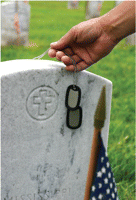President Obama announced last month that he will begin sending letters of condolence to the families of troops who commit suicide in combat zones, abandoning a decades-old unwritten policy that treated suicides differently from other types of deaths when it came to sending condolence letters.
Members of the Armed Forces who die by suicide receive full military honors, but only the families of service members killed in combat, as a result of combat injuries, or in noncombat incidents in a war zone have received condolence letters.
"I have ... decided to reverse a long-standing policy of not sending condolence letters to the families of service members who commit suicide while deployed to a combat zone," said Obama. "This issue is emotional, painful, and complicated, but these Americans served our nation bravely. They didn't die because they were weak."
In July 2010, APA Medical Director James H. Scully Jr., M.D., sent a letter to Obama calling on him "to eliminate the stigma and shame associated with suicide for families and survivors by reversing current policy and forwarding presidential condolence messages to families of individuals who complete suicide while in military service."
A few months later, in October 2010, APA joined other mental health organizations in sending a similar request to the president. "The contributions of these men and women to their country are not less for having suffered a mental illness," said then-APA President Carol Bernstein, M.D., in a written statement (Psychiatric News, November 19, 2010).
The old policy was at least partly based on beliefs within the military services that acknowledging such deaths would encourage more suicides.
The new policy will cover only those personnel who die by suicide in combat zones, not those who kill themselves while in the United States or on overseas bases not directly involved in the war effort.
Last year, 25 of the 155 suicides among Army soldiers occurred in war zones.
The new policy is not retroactive. Families of troops who committed suicide prior to July 6 will not receive condolence letters.
One advocacy group disagreed with that decision.
Presidential condolence letters should be sent to "the next of kin of all those military service members who die while serving honorably, including in military training accidents stateside or by suicide not in combat zones," said Tragedy Assistance Program for Survivors, a support group for those who have lost loved ones who served in the military, following Obama's announcement.
At least 1,100 service members committed suicide from 2003 to 2009. Another 294 active-duty troops and 145 National Guard and Reserve members killed themselves in 2010, according to Department of Defense sources.
The elevated suicide rate continues even as the department strengthened its suicide-prevention programs and sought to eliminate the stigma many in the military attach to seeking mental health care.
"Since taking office, I've been committed to removing the stigma associated with the unseen wounds of war," Obama said in his statement. "Our men and women in uniform have borne the incredible burden of our wars, and we need to do everything in our power to honor their service, and to help them stay strong for themselves, for their families, and for our nation."

